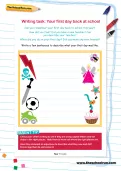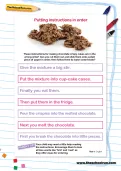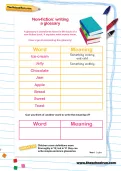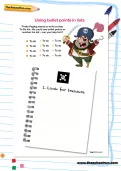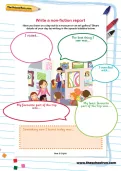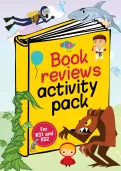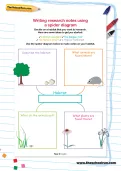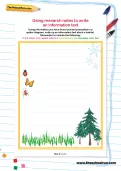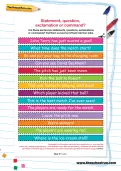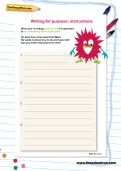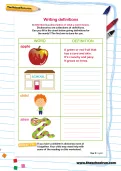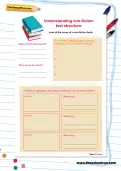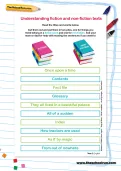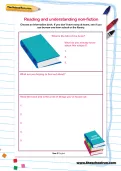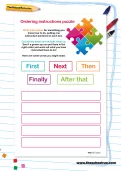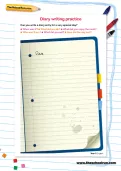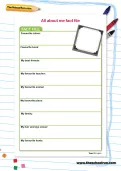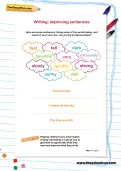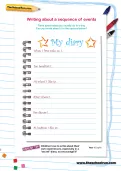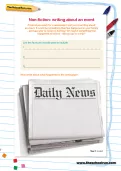Ks1 Non fiction worksheets
Free worksheets: Non fiction, KS1
You’ll need to login or Register first to access these worksheets for free.
Once you’ve tried out our free worksheets, why not explore all our resources (1000s of worksheets, interactive tutorials, learning packs and more) with a 14-day FREE trial subscription.
Writing task: Your first day back at school
Can you remember your first day back to school this year? How did you feel? Did you have a new teacher? Can you describe your teacher? What did you do on your first day? Did you make any new friends? Write a few sentences to describe what your first day was like.
Putting instructions in order
These instructions for making chocolate crispy cakes are in the wrong order! Can you cut them out and stick them onto a plain piece of paper in order, then follow them to make some treats?
Non-fiction: writing a glossary
A glossary is sometimes found in the back of a non-fiction book. It explains what words mean. Have a go at completing this glossary!
Writing for different purposes: invitations
You’re organising a teddy bears’ picnic! First you’ve got to write your invitations. Think of someone you’d like to invite and fill out the invitation below. Do you know what RSVP means? Find out by asking a grown-up.
Using bullet points in lists
Pirate Pegleg wants to write a clear To Do list. He could use bullet points or number his list – can you help him?
Write a non-fiction report
Help your child write about a day out to a museum or gallery with a non-fiction report template, perfect for Year 2 learners and new writers.
Book reviews activity pack
Help your child explore books and language with TheSchoolRun's Book reviews activity pack, a huge collection of reading comprehension and creative writing resources for Year 1 to Year 6.
Writing task: Your first day back at school
Can you remember your first day back to school this year? How did you feel? Did you have a new teacher? Can you describe your teacher? What did you do on your first day? Did you make any new friends? Write a few sentences to describe what your first day was like.
Writing research notes using a spider diagram
Decide on a habitat that you want to research. Then use this spider diagram to make notes on your habitat.
Using research notes to write an information text
Using information you have found out and presented in a spider diagram, write up an information text about a habitat.
Statement, question, exclamation or command?
Are these sentences statements, questions, exclamations or commands? Cut them out and sort them into four piles
Writing for purpose: instructions
When you’re writing instructions it’s important to put everything in the right order. An alien has come down from Mars. He wants to know how to do a forward roll! Can you write instructions for him?
Writing for different purposes: invitations
You’re organising a teddy bears’ picnic! First you’ve got to write your invitations. Think of someone you’d like to invite and fill out the invitation below. Do you know what RSVP means? Find out by asking a grown-up.
Writing definitions
A definition is a description of what a word means. Dictionaries are collections of definitions. Can you fill in the chart giving definitions for the words? The first one is done for you.
Using bullet points in lists
Pirate Pegleg wants to write a clear To Do list. He could use bullet points or number his list – can you help him?
Understanding non-fiction text structure
Look at the cover of a non-fiction book. What is the book about? Turn to the contents page. List four things you’d like to find out about. If there is a glossary, find some words you’ve not heard before.
Understanding fiction and non-fiction texts
Read these titles and words. Cut them out and put them in two piles, one for things you think belong in a fiction book and one for non-fiction. Ask your mum or dad for help with reading the sentences if you need to.
Reading and understanding non-fiction
Choose an information book. If you don’t have many at home, see if you can borrow one from school or the library. What is the title of the book? What are you hoping to find out about? What do you already know about this subject? Read the book and write a list of things you’ve found out:
Ordering instructions puzzle
Write instructions for something you know how to do, putting one instruction sentence in each box. Cut out the boxes and muddle them up. See if a grown-up can put them in the right order and work out what you have instructed them to do! Here are some words you might need: first; next; then; finally; after that.
Diary writing practice
Can you write a diary entry for a very special day? When was it? What did you do? What did you enjoy the most? Who was there? What did you eat? How did the day end?
All about me fact file
Fill in this fact file all about yourself. What is your favourite colour? Your favourite book? Who are your best friends? Your favourite teacher? This is the place to put all those really important facts.
Writing: improving sentences
Here are some sentences. Using some of the words below, and some of your own, too, can you try to improve them?
Writing about a sequence of events
Think about what you usually do in a day. Can you write about it in the diary below?
Putting instructions in order
These instructions for making chocolate crispy cakes are in the wrong order! Can you cut them out and stick them onto a plain piece of paper in order, then follow them to make some treats?
Non-fiction: writing about an event
Pretend you work for a newspaper and you’re writing about an event. It could be something that has happened in your family – perhaps you’ve been on holiday? Or maybe something that happened at school – did you go on a trip?
